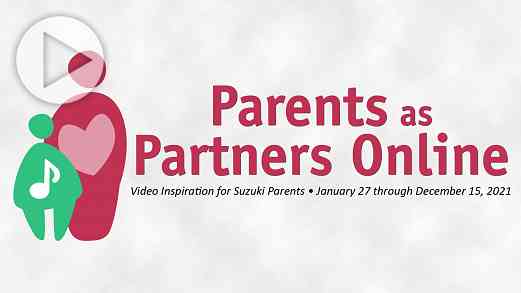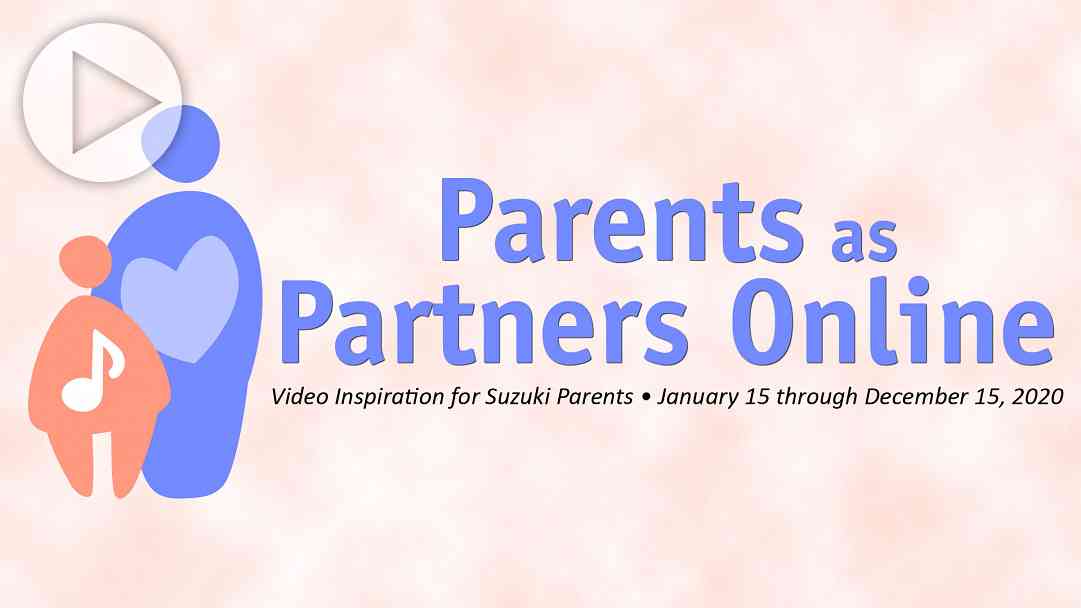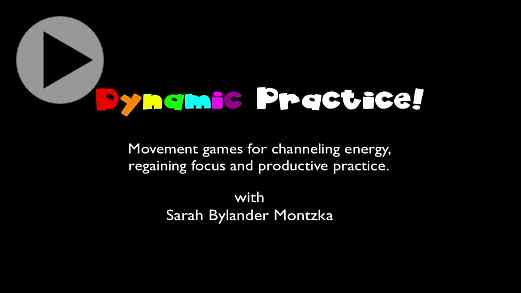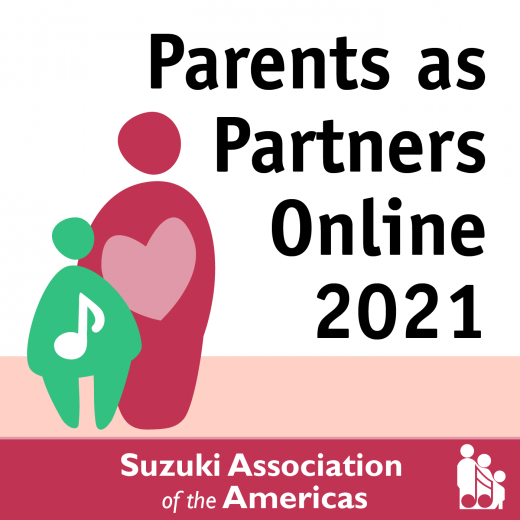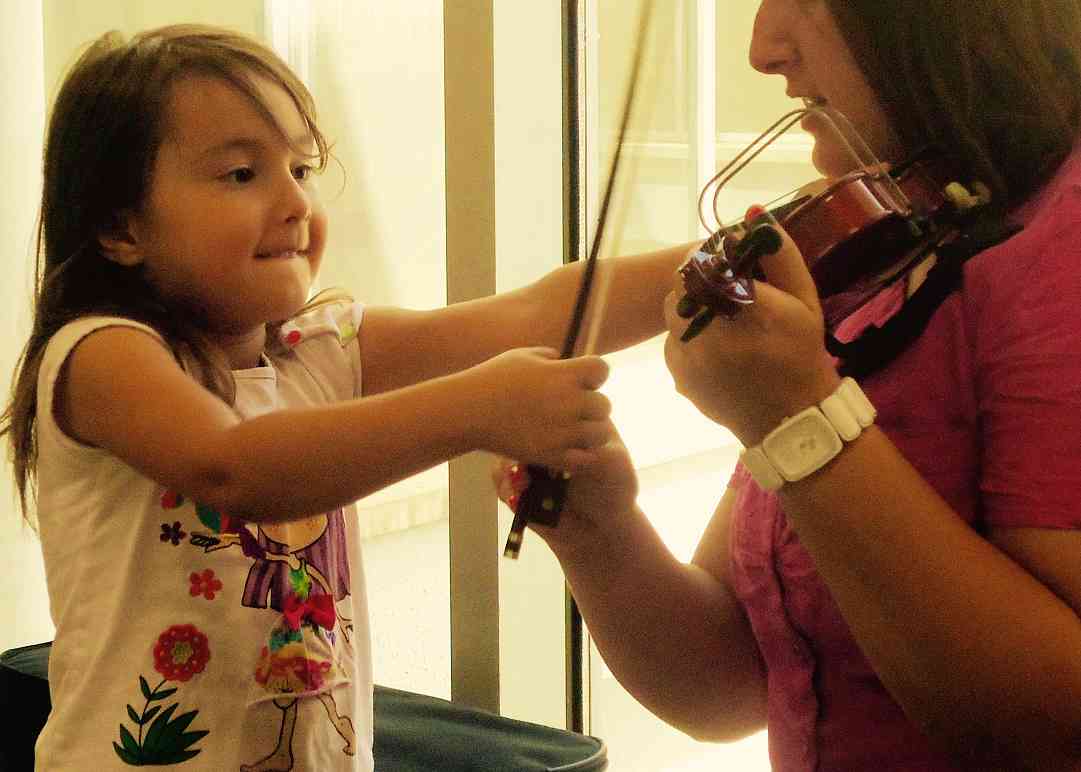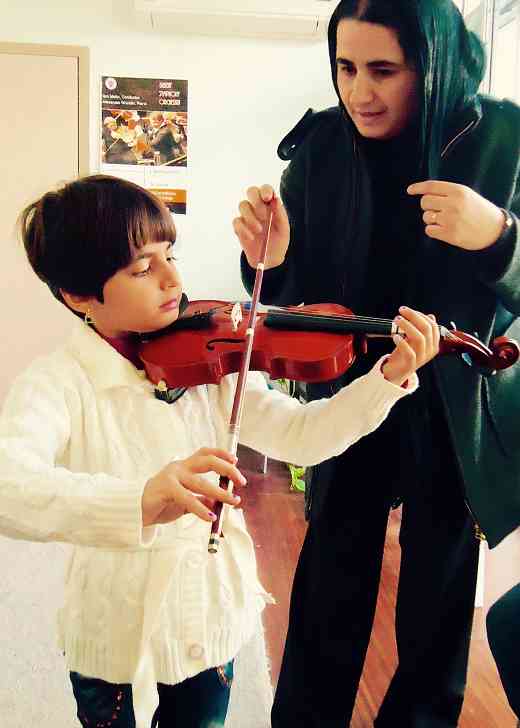Recipe for Achieving Excellence
This is a preview video for Parents as Partners 2021. You can view the rest of the videos for this season by registering for Parents as Partners.

As a professional musician, violin teacher of >20 years, and parent of 2 children, Lisa Hansen has developed a wealth of experience in all aspects of the Suzuki Triangle. In this video, Lisa and her family share 5 essential ingredients for success in raising a musical family.
TRANSCRIPT
Hi- my name is Lisa Hansen. I’m a violin and viola teacher in
Portland, Oregon. My husband Jeff and I are parents of two children.
Zane is 11, and Sloane is 8. Both kids are studying the violin with me.
What makes our musical journey a successful one? We’d like to share five
ingredients which are absolutely indispensable for achieving excellence
with any instrument.
The first ingredient is persistence. You must practice every day.
Playing an instrument is all about muscle memory. If you are inconsistent
about practicing, your brain can’t possibly remember how to instruct your
muscles to move. Muscle memory is key! In our family, we play our
instruments every day, and treat ourselves to doughnuts and a movie
outing every 100 days. I highly recommend creating practice challenges
for your family or studio. Both my kids have passed 1000 days. The allure
of not breaking a practice streak is motivating for my kids, but it is
unbelievably motivating for me and my husband.
Hello, I’m Jeff. The next ingredient on our list is recurrence – and, by
that, we mean listening to your pieces over and over again. Recurrent
listening is the easiest practicing you can do! You can do it while you’re
doing other things – reading, homework, brushing teeth, or eating dinner
– the list is endless! Try to find time to have repertoire playing in the
background whenever you can. When our kids were little, we played the
Suzuki recordings in their rooms as they were falling asleep at night. We
highly recommend that you also watch Michelle Horner’s Parents as
Partners video, which is titled, “Listening Like a Maniac.”
Hi! My name is Zane. Another ingredient is permanence. Practice
doesn’t make perfect – it makes permanent. The key is to practice slowly
enough to play without mistakes. If you play slowly, it is so much easier to
be in control. You don’t have the opportunity to play incorrect notes. It
may seem so wrong, but to learn the fastest, play the slowest. Dr. Molly
Gebrian, a viola professor with a background in neuroscience, says if you
have a spot which you miss regularly, play it correctly five times in a row. If
you’re aiming for five times in a row and miss one repetition, even if it is
the fifth time, you have to start over with the counting and play the spot
correctly six times in a row. If you miss again, you have to start over with
the counting and go for seven times in a row.
HI! My name is Sloane. The next ingredient is competence.
With the 5 times in a row practicing, doing the spots correctly 5 times in a
row for one day does not cut it! You want to practice until you never miss
a spot, not just get it correct one time. When your goal is to build
consistency on the three to ten separate spots, Dr. Gebrian recommends
practicing them interleaved. This means, don’t just do spot A five times,
and then spot B five times, and then spot C five times. Instead, mix the
spots and repetitions up, with pauses in between. For more brilliant tips
on practicing efficiently, see Dr. Gebrian’s “writings” page at
www.mollygebrian.com.
The last ingredient is confidence. You must play your review pieces
regularly, so that you can play with confidence! It is easy to get caught up
with the newest repertoire you might be learning, but it is equally
important to keep the old repertoire in your fingers. Use the old pieces to
build new skills. Play book 1 pieces in your very best posture or sound, or
different bow distribution, in different keys, in different positions, play
with different bow articulations, with vibrato, harmonized with extra thirds
and sixths – the options are endless! The added benefit of keeping all the
repertoire fresh and in your fingers is that you always have repertoire
ready to play for any performing opportunities that may come your way.
My kids enjoy playing for people when we travel, and have raised money
for charities busking at the local farmers’ market. Donating funds to
charities they earned from busking has been deeply rewarding, and helps
motivate them to practice more.
So, to review, the ingredients for achieving excellence on any
instrument are persistence, recurrence, permanence, competence, and
confidence. I hope you have found this helpful. Thank you so much for
watching our Parents as Partners video.
Tags: Parent Perspectives, Parents as Partners 2020, Parents as Partners 2021, Practice, Video
Date: December 11, 2019
